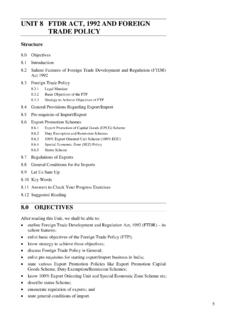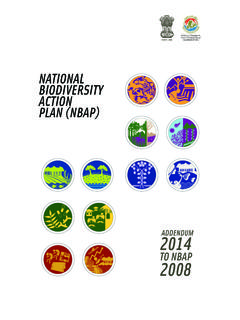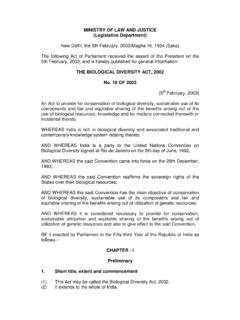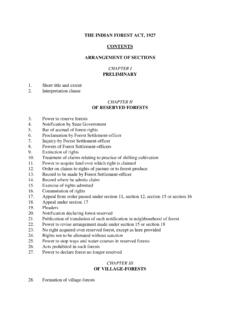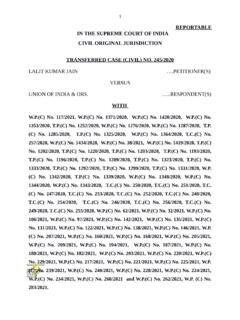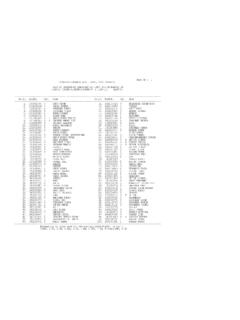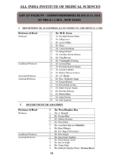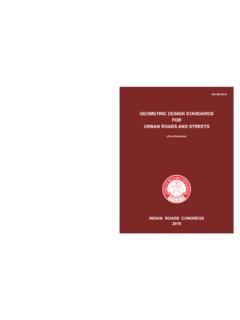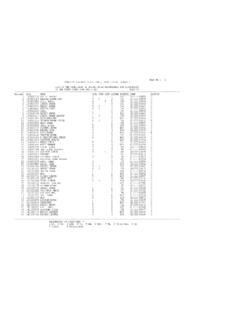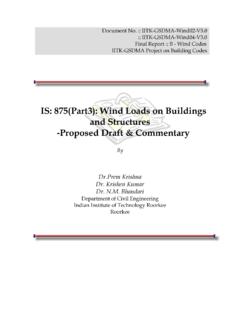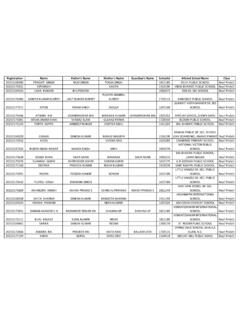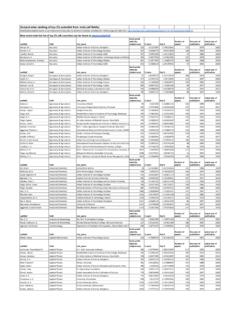Transcription of THE AIR (PREVENTION AND CONTROL OF POLLUTION)1 ACT, …
1 THE AIR (PREVENTION AND CONTROL OF POLLUTION)1 ACT, 19812(Act No. 14 of 1981)[29 March, 1981]An Act to provide for the prevention, CONTROL and abatement of air pollution, for the establishment, with a view to carrying out the aforesaid purposes, of Boards, for conferring on and assigning to such Boards powers and functions relating thereto and for matters connecting therewithWhereas decisions were taken at the United Nations Conference on the Human Environment held in Stockholm in June, 1972, in which India participated, to take appropriate steps for the preservation of the natural resources of the earth which, among other things, include the preservation of the quality of air and CONTROL of air pollution: And whereas it is considered necessary to implement the decisions aforesaid in so far as they relate to the preservation of the quality of air and CONTROL of air It is established law that preamble discloses the primary intention of the statute but does not override the express provisions of the OF OBJECTS AND the increasing industrialization and the tendency of the majority of industries to congregate in area which are already heavily industrialized, the problem of air pollution has begun to be felt in the country.
2 The problem is more acute in those heavily industrialised areas which are also densely populated. Short-term studies conducted by the National Environmental Engineering Research Institute, Nagpur, have confirmed that the cities of Calcutta, Bombay, Delhi, etc. are facing the impact of air pollution on a steadily increasing presence in air, beyond certain limits, of various pollutants discharged through industrial emission and from certain human activities connected with traffic, heating, use of domestic fuel, refuse, incinerations, etc, has a detrimental effect on the health of the people as also on animal life, vegetation and property. the United Nations Conference on the Human Environment held in Stockholm in June, 1972 in which India participated, decisions were taken to take appropriate steps for the preservation of the natural resources of the earth which, among other things, include the preservation of the quality of air and CONTROL of air pollution.
3 The government has decided to implement these decisions of the said Conference in so far as they relate to the preservation of the quality of air and CONTROL of air is felt that there should be an integrated approach for tackling the environmental problems relating to pollution. It is, therefore, proposed that the Central Board for the Prevention and CONTROL of Water Pollution constituted under the Water (Prevention and CONTROL of Pollution) Act, 1974, will also perform the functions of the Central Board for the Prevention and CONTROL of Air Pollution and of a State Board for the Prevention and CONTROL of Air Pollution in the Union Territories. It is also proposed that the State Boards constituted under that Act, separate State Boards for the Preservation and CONTROL of Air Pollution are proposed to be OF OBJECTS AND REASONS OF ACT 47 OF Air (Prevention and CONTROL of Pollution) Act, 1981, was enacted under Art. 253 of the Constitution to implement the decisions taken at the United Nations Conference on Human Environment held at Stockholm in June 1972, in which India Air Act is implemented by the Central and State Governments and the Central and State Boards.
4 Over the past few years, the implementing agencies have experienced some administrative and practical difficulties in effectively implementing the provisions of this Act and has brought these to the notice of Government. The ways and means to remove these difficulties have been thoroughly examined in consultation with the concerned Central Government departments, the State Government and the Central and State Boards. Taking into account the views expressed. Government have decided to make certain amendments to the Act in order to remove such Bill, inter alia, seeks to make the following amendments in the Act, namely:(i)The Central Board is proposed to be empowered to exercise the powers and perform the functions of a State Board in specific situations, particularly when a State Board fails to act and comply with the directions issued by the Central Board. It is also proposed to recover the cost of the exercise of such powers and the performance of such functions by the Central Board from the person or persons concerned, if the State Board is empowered to recover such costs under the provisions of the Act, as arrears of land revenue or of public demand.
5 (ii)It is proposed to make it obligatory on the part of a person to obtain the consent of the relevant Board even while establishing an industrial plant.(iii)It is proposed to empower the Boards to obtain information regarding discharge of pollution in excess of specified standards by the industries operating even outside the air pollution CONTROL areas.(iv)In order to prevent effectively air pollution, the punishments provided in the Act are proposed to be made stricter.(v)In order to elicit public co-operation, it is proposed that any person should be able to complain to the Courts regarding violations of the provisions of the Act after giving a notice of sixty days to the Board or the officer authorized in this behalf.(vi)It is proposed to omit the Schedule to the Act so as to make the Act applicable to all the industries causing air pollution.(vii)It is proposed to empower the Boards to give directions to any person, officer or authority including the power to direct closure or regulation of offending establishment or stoppage or regulation of supply of services such as, water and electricity.
6 (viii)It is proposed to empower the Boards to approach courts to pass orders restraining any person from causing air pollution.(ix)For increasing the financial resources of the Boards, it is proposed to empower them to raise money by means of obtaining loans and issue of of objects and Reasons Use of The law is well settled, in Narain Khamman v. Parguman kumar Jain, 1 the Supreme Court held that though the Statement of Objects and Reasons accompanying a legislative Bill could not used to determine the true meaning and effect of the substantive provisions of a statute, it was permissible to refer to the same for the purpose of understanding the background, the antecedent state of affairs, the surrounding circumstances in relation to the statute, and the evil which the statute sought to The Bill seeks to achieve the above it enacted by Parliament in the Thirty-second Year of the Republic of India as follows:CHAPTER title, extent and commencement. (1) This Act may be called the Air (Prevention and CONTROL of Pollution) Act, 1981.
7 (2) It extends to the whole of India.(3) It shall come into force on such date3 as the Central Government may, by notification in the Official Gazette, In this Act, unless the context otherwise requires, -(a) air pollutant means any solid, liquid or gaseous substance 4[(including noise)] present in the atmosphere in such concentration as may be or tend to be injurious to human beings or other living creatures or plants or property or environment;(b) air pollution means the presence in the atmosphere of any air pollutant;(c) approved appliance means any equipment or gadget used for the burning of any combustible material or for generating or consuming any fume, gas or particulate matter and approved by the State Board for the purposes of this Act;(d) approved fuel means any fuel approved by the State Board for the purpose of this Act;(e) automobile means any vehicle powered either by internal combustion engine or by any method of generating power to drive such vehicle by burning fuel.
8 (f) Board means the Central Board or a State Board.(g) Central Board means the [Central Pollution CONTROL Board] constituted under Sec. 3 of the Water (Prevention and CONTROL of Pollution) Act, 1974 (6 of 1974);(h) chimney includes any structure with an opening or outlet from or through which any air pollutant may be emitted;(i) CONTROL equipment means any apparatus, device, equipment or system to CONTROL the quality and manner of emission of any air pollutant and includes any device used for securing the efficient operation of any industrial plant;(j) emission means any solid or liquid or gaseous substance coming out of any chimney, duct or flue or any other outlet;(k) industrial plant means any plant used for any industrial or trade purposes and emitting any air pollutant into the atmosphere;(l) member means a member of the Central Board or a State Board, as the case may be, and includes the Chairman thereof;(m) occupier , in relation to any factory or premises, means the person who has CONTROL over the affairs of the factory or the premises, and includes, in relation to any substance, the person in possession of the substance;(n) prescribed means prescribed by rules made under this Act by the Central Government or, as the case may be, the State Government;(o) State Board means:(i)in relation to a State in which the Water (Prevention and CONTROL of Pollution) Act, 1974), is in force and the State Government has constituted for that state a [State Pollution CONTROL Board] under sec.
9 4 of that Act, the said State Board; and(ii)in relation to any other State, the State Board for the Prevention and CONTROL of Air Pollution constituted by the State Government under Sec. 5 of this principle of construction There is one principle on which there is complete unanimity of all the Courts in the world and this is that where the words or the language used in a statute are clear and cloudless, plain, simple and explicit, unclouded and unobscured, intelligible and pointed so as to admit of no ambiguity, vagueness, uncertainty or equivocation, there is absolutely no room for deriving support from external aids. In such cases, the statute should be interpreted on the face of the language itself without adding, subtracting or omitting words therefrom. Where the language is plain, and unambiguous the Court is not entitled to go behind the language so as to add or supply omissions and thus play the role of a political reformer or of a wise counsel to the Legislature.
10 Definition Interpretation of While interpreting a definition, it has to be borne in mind that the interpretation placed on it should not only be not repugnant to the context, it should also be such as would aid the achievement of the purpose which is sought to be served by the Act. A construction which would defeat or was likely to defeat the purpose of the Act has to be ignored and not IICENTRAL AND STATE BOARDS FOR THE PREVENTION AND CONTROL OF AIR POLLUTION[3. Central Pollution CONTROL Board The Central Pollution CONTROL Board constituted under Sec. 3 of the Water (Prevention and CONTROL of Pollution) Act, 1974 (6 of 1974), shall, without prejudice to the exercise and performance of its powers and functions under that Act, exercise the powers and perform the functions of the Central Pollution CONTROL Board for the prevention and CONTROL of air pollution under this section relates to the constitution of Central Pollution Board. It is similar to the Board constituted under Sec.]

